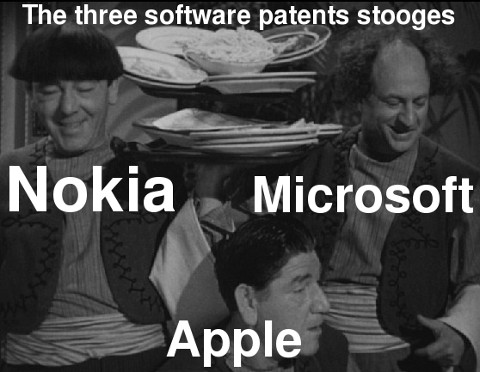04.09.14
Posted in News Roundup at 1:52 pm by Dr. Roy Schestowitz
-
-
-
-
-
-
-
-
-
-
-
-
Linux-based distributions support live session which means you can run an entire operating system from the DVD or USB without installing anything on the hard drive. A user can use all programs which come pre-installed with the operating system, which may vary from one operating system to another. It’s a very neat way of testing Linux without formatting your hard drive. It’s also a safe way of doing sensitive work when you don’t want to leave any trace on the machine.
-
-
-
-
-
-
-
-
-
-
-
Several decent video editors are available on the Linux platform. Kdenlive, OpenShot, Cinelerra and Pitivi are those that come to mind as “big players” in an admittedly small market. I’ve used them all through the years, with varying levels of success. A frustration of mine is that invariably, I end up using a proprietary video editing suite like iMovie or Final Cut Pro when I have to do a larger project. As an open-source enthusiast, that doesn’t settle well with me.
-
As you may already know, LaTeX is an extremely useful document markup language. Whether it is for a research paper, a math homework, a presentation, or a fancy resume, LaTeX is pretty much the go to language. However, its syntax can be a bit confusing at first, and it is recommended, at least in the beginning, to use a LaTeX editor software. Now I know that a real purist would do everything using Vim or Emacs, and please put those stones down. Some LaTex editors on Linux are actually pretty well thought and can prove to be quite useful too. I will present to you three of those editors, which in my opinion are worth a shot as their philosophies are different, and appropriate and to any situations.
-
-
-
-
-
-
-
-
-
-
-
Permalink
 Send this to a friend
Send this to a friend
Posted in Apple, Microsoft, Patents at 5:40 am by Dr. Roy Schestowitz

Summary: Reporting in corporate media generally lacks focus on patent abuse by large companies, but Topix has a long noteworthy article
PATENT coverage has been scarce here recently because corporations won. They warped the debate in such a way that almost no articles criticise software patents anymore; the focus has been shifted to small trolls and politicians are, accordingly, ignoring the big issue, instead pursuing fake ‘reforms’ that hardly address any concerns, other than the concerns of big corporations (it’s like Obama’s so-called ‘reform’ of the NSA). Here for a change is a good Topix article titled “How to Really Fix Patents – and Why Congress Is Unlikely to Do It” (via Glyn Moody).
The article says: “The total loss to the economy caused by junk patents far exceeds $29 billion per year when one takes into account that big companies act like patent trolls too, by obtaining junk patents to keep out their competitors.”
It also states that: “The real costs of junk patents are easy to imagine when you consider some of the egregious patents that should never have existed to begin with. Patent No. 5,851,117 was granted in 1998 to a company for using an illustrated book to teach janitors how to clean a building. Clearly that is not such an original idea that it deserves to be patented. Luckily the economic impact of that patent was likely very minimal.”
And finally: “Patent trolls should be dealt with, but if big companies are able to continue to obtain junk patents for things that are not inventions and then act like patent trolls, then they will be able to continue to corner markets and ensure that new emerging technologies can’t compete with them.”
We recently wrote about Apple's "holy war" against Linux/Android — a subject that was mentioned by a lot of media [1, 2, 3, 4]. Nokia‘s patent deal with Apple, which had already cross-licensed with Microsoft for quite a long time (we have written about this triangle for a number of years), helped show how this “holy war” was going on. This new article states that “Nokia makes up about 80% of them [...] the vast majority of licensing fees Microsoft collects — about $15 per device — comes from the Finnish company. Those fees are about to become an internal exchange once the acquisition deal closes between the two companies.”
The ultimate victim will be Android. They are working on it.
To make matters worse, Microsoft and Nokia feed Android-hostile patent trolls like MOSAID, passing patents for no purpose other than harassment (patent-stacking).
This is trolling. The European authorities have already warned/reprimanded Nokia.
What needs to change right now is the debate. We need to reject the idea that there is this thing called “patent trolls” which basically means small companies with patents and that this alone is the issue with patents. There are much bigger issues. █
Permalink
 Send this to a friend
Send this to a friend
Posted in Free/Libre Software, FUD at 5:19 am by Dr. Roy Schestowitz
Proprietary but pretending to be pro-FOSS

Summary: Tech City News, Black Duck, and Protecode (in SD Times) show their hostility towards the principles of code-sharing
EVERY ONCE in a while we see articles which are exceptionally hostile towards Free software in the sense that they compare it to a disease. They use words like “contaminate” and “infect”. Here is a new article of this kind. This is the type of FUD that companies like Black Duck, whose latest voice hijack we mentioned twice this month alone, habitually spread. They monetise it. There is more of them in the press and pundits like Mac Asay [1] help them get their message out. Well, they are trying to change perceptions and set trends. Asay is close to them because they helped sponsor events that he was organising. But they are not to be viewed as FOSS proponents. They are a proprietary software company with software patents; they only pretend to care about FOSS and they pretend to be spokespeople for FOSS. Their founder is a marketing man from Microsoft.
Similarly, some proprietary software company called Protecode (with a similar business model) pushes similar messages, having been given a platform at SD Times which is sometimes composed by patent lawyers (and is funded in part by Microsoft). The article then led to more from Adrian Bridgwater.
What we generally have here is a bunch of proprietary players (some with clear connections to Microsoft) talking about how complying with FOSS is risky. They never mention the risk of proprietary software licences that ‘expire’ and can lead to expensive litigation if not obeyed. The only surprising thing is that they continue to receive press space. █
Related/contextual items from the news:
-
Permalink
 Send this to a friend
Send this to a friend
Posted in Microsoft, Mono at 4:58 am by Dr. Roy Schestowitz

Summary: Microsoft creates an alliance with the controversial firm of FOSS mole Miguel de Icaza while trying to openwash .NET (creating the illusion that it is “open”)
WE RECENTLY showed how the Microsoft press was openwashing .NET. It’s a PR charade. Watch this shameless new plug from Microsoft Mary at CBS/ZDNet/CNET (cross-posted in several CBS sites for increased exposure). It’s Microsoft evangelism disguised as journalism and there’s more of it at IDG. It should be remembered that .NET is proprietary. Nothing has really changed. Microsoft already controls a considerable chunk of Mono and now it’s trying to openwash .NET itself, presumably with help from Miguel de Icaza and other turncoats whom Microsoft Mary is naming. The goal is to confuse people and lead them to the misguided feeling that .NET is now “open” (to Windows) and is therefore on par with Java.
Last month there were reported of acquisition talks between Microsoft and Xamarin, which already receives funding from Microsoft people. Well, Microsoft has no need to buy them if they can be used as outsiders/proxies, a bit like Yahoo or Novell. So this news report [1] titled “Microsoft, Xamarin Form Open Source Tech Alliance” is not too shocking. It just helps show another step in alignment of those two companies. In practical terms, Xamarin is now serving Microsoft but it is not officially part of Microsoft. █
Related/contextual items from the news:
-
Microsoft and Xamarin have partnered to establish a technology consortium that aims to help developers build computing applications based on Microsoft’s .NET programming framework.
Permalink
 Send this to a friend
Send this to a friend
04.08.14
Posted in News Roundup at 1:18 pm by Dr. Roy Schestowitz
Drones
-
An artists collective has unfurled a massive poster showing a child’s face in a heavily bombed area of Pakistan in the hopes that it will give pause to drone operators searching the area for kills.
According to #notabugsplat, named after the description given to kills on the ground when viewed through grainy video footage, the artists – with help of villagers – unfurled the giant poster in a field in the Khyber Pukhtoonkhwa region of Pakistan.
The hope is that it will increase awareness of drone operators of human cost, or ‘collateral damage’, when drones are used to attack targets on the ground.
-
-
-
-
-
Illegal U.S. drone strikes continue (the Long War Journal says there have been eight drones strikes in Yemen so far this year), but efforts to curb the use of killer drones have made remarkable headway this year.
-
-
Provincial security chief, Gen. Abdul Habib Syedkheli also confirmed the death of 12 Taliban militants including the two senior Taliban leaders.
-
-
-
Up until now, there have been only estimates of deaths from drone strikes from organizations such as Human Rights Watch and the Bureau of Investigative Journalism. The lack of accurate data means that the public cannot form fully informed views on the costs and benefits of American drone policy. The availability of hard data is critical in order to legitimize American military actions for other countries and to ensure that no one branch of government monopolizes military decision making on drones.
Drones themselves are not undemocratic, but the current system of secrecy and opaque decision-making is questionable. Drones have the potential to do great harm, which is why separate branches of the U.S. government must carefully monitor their use. There are undeniable benefits of using unmanned aircraft, but the government, especially President Obama, must stay vigilant to ensure that the ends really do justify the means.
-
What sets us apart from other countries, however, is that our population – if not our politicians – genuinely believes in the values espoused by our constitution. I also have faith that our democracy is receptive to change. Being American means that we have a responsibility to make sure that we feed the bright light that is the American experiment while being conscious of the shadows our choices create. Our drone policy is a heck of a shadow.
Venezuela
-
Venezuela isn’t as divided as its right-wing opposition would have you believe.
-
Progressives should be less concerned about how people are protesting and more concerned about who is mobilizing and what they’re fighting for.
Ukraine
-
Both protests in Kiev, Ukraine and Bangkok, Thailand kicked off in late 2013.
-
Power Abuses and Looting
-
General Motors Co. is shielded from legal liability for nearly all accidents that occurred before its July 2009 exit from bankruptcy. That protection has emerged as one of the most controversial aspects of the automaker’s ignition switch recall.
-
-
On December 21, 2013 Mexico’s president, Enrique Peña Nieto, posed for the cameras holding the official decree ending the 75-year history of the national oil company, PEMEX. The decree also closed the era in which Mexico’s electrical generating and distribution system had been under the control of two public institutions—Central Light and Power (LyFC), from 1960 to 2009, and the Federal Electricity Commission (CFE), from 1937 to 2013. In a literal sense, neither PEMEX nor CFE will cease to exist, but they will quickly become mere shadows of what they were: the two largest firms operating in Mexico. In response to these comprehensive changes, noted public intellectual Arnaldo Córdova has acknowledged that “the Constitution is dying,” while Cuauhtémoc Cárdenas declared: “Never, throughout our history as an independent nation, has the country seen such a dismantlement of the protections to our sovereignty and self-determination.”1 For its part, the Mexican government immediately saturated the news media with full-page ads, the most prominent of which declared: “The oil will continue to belong to the Mexicans.”
-
One duo now on death row embezzled roughly $25 million from the state-owned Vietnam Agribank. Their co-conspirators caught decade-plus prison sentences.
In March, a 57-year-old former regional boss from Vietnam Development Bank, another government-run bank, was sentenced to death over a $93-million swindling job.
According to Vietnam’s Tuoi Tre news outlet, several of his colluders were sentenced to life imprisonment after they confessed to securing bogus loans with a diamond ring and a BMW coupe. And last week, in an unrelated case, charges against senior employees from the same bank allege $47 million in losses from dubious loans.
None of this would impress Bernie Madoff, mastermind of America’s largest ever financial fraud scheme. The combined amount from all three Vietnamese cases adds up to less than 1 percent of his purported $18-billion haul.
But these death sentences nevertheless are high profile scandals in Vietnam.
That’s the point. Human rights watchdogs contend that splashy trials in Vietnam are acts of political theater with predetermined conclusions. The audience: a Vietnamese public weary of state corruption. But these sentences also sound loud alarm bells to dodgy bankers who are currently running scams.
-
London’s housing market is being turned into a billionaire’s casino…
Privacy
-
Not so, according to a post by Jeremy Gillula, a staff technologist at the Electronic Frontier Foundation (EFF). In a blog he complains that most Web sites still don’t support HTTPS Strict Transport Security (HSTS), a standard that was approved in the fall of 2012 by the Internet Engineering Steering Group.
NSA
-
Supreme Court declines an early look at a challenge to the NSA’s bulk collection of American’s phone records — but that doesn’t mean it won’t hear the case down the road.
-
The move isn’t surprising, as it is unusual for the Supreme Court to allow escalations straight from district courts without letting the US Court of Appeals have a go at it first.
-
Lawyer Larry Klayman won the first round of the case against America’s top online spying agency in December, when District of Columbia Judge Richard Leon found in favor of the plaintiff, saying the NSA tactics were an “arbitrary invasion” that was “almost Orwellian.”
-
“British intelligence agencies do not circumvent domestic oversight regimes by receiving from US agencies intercept material about British citizens which could not lawfully be acquired by intercept in the UK”.
-
The National Security Agency (NSA) has been flooded with thousands of Freedom of Information Act (FOIA) requests from journalists, civil rights groups and private citizens who have asked the agency to turn over the top-secret records that former contractor Edward Snowden leaked to the media, Al Jazeera can reveal.
-
Sensitive government committees aimed at boosting India’s cyber security and formulating its internet policy have featured intensive participation by representatives of US telecom giant AT&T, a company with a record of voluntary participation in online spying by the US, and a strong interest in ensuring rules of the internet road favour large corporations.
-
-
-
When the original Captain America movie came out, many wondered how well it would play in massive new Asian markets like China. Would a superhero movie with an in-your-face, pro-America message fare well? Well, the first movie in the franchise was a bit weak outside the U.S. — it grossed $194 million in all international markets combined. Fairly mediocre.
-
When it suits them — and when events affect their bottom line — these companies like to make a stink about democracy and free speech. After humblebragging about calling President Barack Obama to complain about NSA snooping, Facebook CEO Mark Zuckerberg delivered a paean to the Internet’s utopian spirit:
Together, we can build a space that is greater and a more important part of the world than anything we have today, but is also safe and secure. I’m committed to seeing this happen, and you can count on Facebook to do our part.
Sounds good!
But while Facebook claims to take seriously the security concerns of its billion-plus users, it’s also in the business of mining and exploiting its customers’ data.
-
-
When federal prosecutors charged Colorado resident Jamshid Muhtorov in 2012 with providing support to a terrorist organization in his native Uzbekistan, court records suggested the FBI had secretly tapped his phones and read his emails.
But it wasn’t just the FBI. The Justice Department acknowledged in October that the National Security Agency had gathered evidence against Muhtorov under a 2008 law that authorizes foreign intelligence surveillance without warrants, much of it on the Internet. His lawyers have not been permitted to see the classified evidence.
Snowden
-
-
No legal means exist to challenge mass surveillance, said NSA whistleblower Edward Snowden, testifying to the Parliamentary Assembly of the Council of Europe.
-
On Monday, the Ridenhour Foundation announced that NSA whistleblower Edward Snowden and journalist Laura Poitras will be awarded the Truth-Telling Prize for their collaborative efforts to expose the U.S. government’s massive online surveillance operations.
-
Hayden
-
It would appear that former NSA and CIA boss Michael Hayden has some anger management issues to work out. We thought he was just a little nutty in the past — calling Snowden’s supporters internet shut-ins and insisting that Snowden himself (a non-drinker) was bound to end up an alcoholic. But in the past few days, he’s gone somewhat ballistic in attacking various elected officials and government employees in a manner that sounds like he’s literally asking to get into a fist fight.
-
-
-
Michael Hayden, the former director of the National Security Agency and the Central Intelligence Agency, told a student audience Monday that missiles fired by drone aircraft were often so useful in removing enemies from the battlefield that the negative secondary effects were worth accepting.
-
Nearly five years after the Senate Intelligence Committee began an investigation into the CIA’s detention and interrogation methods following the Sept. 11, 2001, terrorist attacks, the panel voted, 11-3, to release a report detailing its findings.
-
U.S. Sen. Ron Wyden blasted former CIA and NSA director Michael Hayden on Monday for his “outrageous” suggestion that Senate Intelligence Committee Chairman Dianne Feinstein lacked objectivity on the CIA’s “torture and coercive interrogations” of foreign terrorism suspects.
-
Responding to former CIA Director Michael Hayden’s loaded remarks calling a Senate committee chairwoman too “emotional,” top Democrats unleashed a broad counterattack this week panning the “condescending” comments.
Militarism
-
Soldiers do not go to fight the unknown enemies on their own. They are indoctrinated and pushed to war paradigm by the political monsters who use them as digits and numbers – to compile official statistic, and to support the economy of dehumanization. Consequently, the fighting soldiers – men of conscience lose unity of the human consciousness – unity of material and spiritual factors of life and balanced characteristic– fair and foul. It is a tragic conjuncture of inner revolt of human consciousness for a crime that is not part of the human nature and character and not visible to scientifically expert minds – the doctors who simply identify mental health issues of those suspected of syndrome to commit suicide. These are the net causalities of man’s insanity against man. The real reasons are hardly mentioned in expert reports.
CIA
-
Dick Cheney, Patient Zero in this particular outbreak, and a towering public combination of inhumanity and cowardice, is out in public bragging about how deeply infected he is. (His daughter, Liz, went on TV over the weekend and suggested that we should ignore the decade of torture inspired by her father and concentrate instead on the true crime of the past 20 years…Benghazi.) Over the weekend, the inexcusable Fred Hiatt loaned the space over which he presides at The Washington Post to Jose Rodriguez, a truly monstrous figure in the events in question, so that Rodriguez could spread the infection even further through the subject population.
-
-
-
High-Level U.S. Officials Debunk CIA Claims About Bin Laden
-
The partial declassification of a report critical of interrogation and detention policies used by the CIA after 9/11 is a crucial part of confronting the abuses of our past.
-
-
-
New details emerged last week outlining the CIA’s use of torture during the Bush Administration, after the Senate Intelligence Committee voted to declassify a comprehensive report. But don’t ask the government officials behind the program to actually call it torture. As Jon Stewart explained on last night’s The Daily Show, it was more along the lines of “super-aggressive, terrorist suspect spa treatments.”
-
Every once in a while, the CIA’s “Because I said so” club lets loose with a bit of preposterous condescension that reminds us why, along with extraordinary rendition and drone strikes, we’re also a nation of transparency and checks and balances. In this case, the crowing comes from Jose A. Rodriguez Jr., former head of the CIA’s National Clandestine Service and the administrator of that agency’s post-9/11 enhanced interrogation (i.e., torture) program. We shouldn’t believe the “shocking” results of Senator Dianne Feinstein’s (D-CA) Senate Intelligence Committee’s investigation, Rodriguez says, especially those that lay bare the lies and exaggerations promulgated by the CIA and the ineffectiveness of the program itself.
Why not? Because Rodriguez was there, and you weren’t. Never mind that Rodriguez hasn’t actually read the report, or the fact that CIA-sponsored torture isn’t a yoga class, so “being present” doesn’t really count as the endeavor’s ultimate objective. And never mind the findings of the “Internal Panetta Review,” conducted by the CIA, that, according to Senator Feinstein, “documented at least some of the very same troubling matters already uncovered by the committee staff—which is not surprising, in that they were looking at the same information.”
Permalink
 Send this to a friend
Send this to a friend
Posted in GNU/Linux, Microsoft, Virtualisation at 11:17 am by Dr. Roy Schestowitz
Breaking the competition rather than competing

Summary: Microsoft’s Hyper-V is reportedly being used to cripple and marginalise — artificially — guests that are running GNU/Linux
MICROSOFT apparently has not gotten enough advantage with UEFI exclusion of GNU/Linux from new PCs. We recently learned that a lot of new computers (without Windows XP) will simply refuse to have GNU/Linux installed and/or running. Even some technical people in JoinDiaspora say that they are unable to install GNU/Linux on such computers (not OS-agnostic machines anymore, as per Microsoft’s manipulative legal requirements).
Adding insult to injury, Microsoft now uses Hyper-V, the proprietary hypervisor which is strictly attached to an NSA honeypot (Microsoft Windows), for something that resembles AARD. iophk called it “AARD again” and it should be treated as a serious antitrust violation.
Citing the original report [1], Susan Linton writes: “The Register is running an article explaining how Microsoft is trying to sabotage Linux.”
The article begins by stating that “Hyper-V was found to treat Linux guests as second-class citizens” and it should not be too shocking given that Hyper-V drivers for Linux were originally a GPL violation (Microsoft was forced to comply). This is one of the things that Microsoft paid Novell to help with (others being .NET, Moonlight/Silverlight, OOXML, patent FUD, and more).
With the death of Windows XP it is possible that the common carrier for desktops/laptops will soon be no more. FUD games like these ones are only to be expected from the thuggish, criminal company. █
Related/contextual items from the news:
-
If Microsoft’s Hyper-V was found to treat Linux guests as second-class citizens, the resulting storm of controversy would probably generate enough heat and light to make a dent in some climate change models.
Permalink
 Send this to a friend
Send this to a friend
Posted in GNU/Linux, Microsoft, Windows at 10:47 am by Dr. Roy Schestowitz
Windows aging

Summary: The corporate press mentions the end of Windows XP (no more support) but rarely does it mention GNU/Linux; a migration to Free/libre software is simpler than commonly believed
THE apparent distraction efforts aside, today is the last day for Windows XP as a live operating system. In light of that serious event (relevant to many because Windows XP is still widely used), some articles don’t even mention GNU/Linux at all (see the comments, readers are not easily misled) and some provide only scarce coverage for remedies like Robolinux [1], despite an expensive press release [2,3] which was disseminated in various sites. We found only one article about Robolinux (there may be more, but they are not going ‘on the radar’).
This is rather disappointing. There are orders of magnitude (in terms of numbers) more articles about the Heartbleed® stunt (from Microsoft’s ‘former’ security chief) than about GNU/Linux as the logical route for computers that still run Windows XP. Users of these computers can use Wine or even the improved (but proprietary) versions of software that incorporates Wine. Inside a company they can rely on remotely-accessed application servers running Windows for troublesome applications, with rdesktop/vnc for remote access from GNU/Linux desktop (that’s what one can do at the worst scenarios) and Steven J. Vaughan-Nichols (SJVN) shows how trivially it’s done (very visual).
What we are hoping to find is that more people follow advice which recommends at least mentions migration to GNU/Linux now that Windows XP is unsupported [4-9] (there ought to be be more coverage like this). Putting the derogatory phrase aside, right now there is a big opportunity for GNU/Linux on the desktop [10], and not just because of Chrome OS (which is a GNU/Linux distribution but not a freedom-respecting one). People can now swap a PC running Windows XP with a shiny new Chromebook for just $99 and there are many options when it comes to Chromebooks [11]. Whatever people choose, they need to escape the trap of PRISM (mass surveillance) and proprietary software. BSD too is an option. █
Related/contextual items from the news:
-
Robolinux, a fast and easy to used Linux distribution based on Debian, has just received another major update, raising the version number to 7.4.2.
-
-
Robolinux, founded in 2011, invented and has released “Revolutionary Stealth VM” so you can run Windows XP or 7 inside all Linux Mint OS Editions or all Ubuntu Versions and Derivatives Virus Free for as long as you want to without the need for Microsoft security updates or anti virus anti malware software.
-
This week, Microsoft ends free support for Windows XP, cutting off the supply of security updates and bug fixes to anyone unwilling to pay the $200 per desktop fee MS is asking for extended support.
XP machines aren’t just going to explode at midnight on 8th April but with hackers and malware authors already comfortable with the antiquated OS, it won’t be long before some new exploit is discovered that will never be fixed. In short, if you value security then it makes sense to stop using XP.
-
It’s doubtful there are many people out there at this point that don’t already know that support for Windows XP will come to an end tomorrow, April 8th. Despite that, a number of individuals and businesses will continue to run the operating system.
This doesn’t likely apply to those maintaining an HTPC, as this tends to be a more geek-savvy set, but no doubt a few are out there. For those users, XBMC has passed its judgment, and the verdict is Linux.
-
Other than Windows, users and companies could look at Linux versions that run many Internet servers and those in companies. GNU/Linux is also at the foundation of Google Inc’s Android mobile OS.
Linux distributions include Ubuntu, Linux Mint, Elementary, Zorin and Lububtu. Ubuntu 12.04, for instance, comes pre-installed with the LibreOffice suite—a Microsoft Office equivalent. However, migrating applications from Windows XP to a non-Windows (read Linux) platform is easier said than done. But then, Linux distributions are free.
-
Microsoft’s decision to stop providing technical support for Windows XP after Tuesday has caused a great deal of confusion and consternation among the millions who still use the trusty old operating system. I’ve opined that there’s no reason to ditch Windows XP, which will continue to work as it always has, and that you can safeguard its security by installing a good antivirus/antimalware program.
However, there is another solution that is faster and more secure than Windows XP – or any other version of Windows. It’s Linux, the long-suffering stepchild of the PC industry.
-
Today, as Microsoft discontinues support for Windows XP, a 12 year old operating system, users all over the world find themselves with only a few options to choose from as they move on. It’s not surprising that Microsoft encourages users to migrate to Windows 8.1, but of course, there are other alternatives. The best one by far is Linux. With over 100 distributions, Linux not only offers flexibility, but also reliability and support.
-
Microsoft’s Windows XP dies on April 8, and I will not be among those who mourn its loss. The sad part about the death of XP is that those who still run it might not even realize that their operating system is now dead.
-
It used to be a rallying cry, then it turned into speculation and finally it became a joke: That the next year, or the one after that, or very soon at least, would be “the year of the Linux desktop”. Even the meaning of the term has changed a bit, depending on the time and the publication. Maybe it means the year when Linux will be a majority operating system on desktop computers. Maybe it means that Linux accounts for a significantly increased share of the market.
[...]
But as I have been using Linux in the past several years, it has increasingly occurred to me: We’re at a point where we have a large number of incredibly polished distributions available. You can run a Linux system for a standard user without barely ever touching the terminal. There’s a wealth of software, both applications and games available, most hardware works without any worry, and the days of manually editing xorg.conf, our old best friend, are pretty much gone.
-
Permalink
 Send this to a friend
Send this to a friend
Posted in Deception, GNU/Linux, Microsoft, Security at 10:17 am by Dr. Roy Schestowitz
Microsoft software has back doors by design

Summary: A sense of perspective in the debate over security, especially now that Windows XP is left open to crackers (other than the NSA) and Microsoft is known to be ratting on so-called ‘customers’
LAST year it was confirmed that Microsoft had been telling the NSA how to crack its software before this software could even be patched. In other words, Microsoft gave back doors to the NSA. Microsoft gave a bunch of government-sanctioned crackers monopoly or preferential access to the data and computers of Microsoft’s so-called ‘customers’. Microsoft went further than this by providing the NSA with direct access to data of so-called ‘customers’ who put their data on Microsoft servers or used Microsoft networks such as Skype or Hotmail for communication.
“Microsoft gave a bunch of government-sanctioned crackers monopoly or preferential access to the data and computers of Microsoft’s so-called ‘customers’.”Microsoft hardly behaves like a software company. Microsoft is an informant. As one article put it some days ago: “The Snowden documents also revealed that Microsoft allegedly helped the NSA intercept web chats on its new Outlook.com portal.”
That’s just the tip of the iceberg, but it’s stuff such as this which CIOs and CTOs must remember when moving away from Windows and from Microsoft (altogether).
Now that we know there’s 'former' Microsoft staff behind the new Heartbleed® publicity blitz (maybe the latest of or an extension of the security smears against GNU/Linux, which basically accompany that end of Windows XP patches) we should remember what the alternative to GNU/Linux (and BSD) is. The main alternative is PRISM club — a club which conspires with the NSA against computer users.
Trending in Twitter right now is the hashtag “openssl” and the reason for this is Heartbleed®, which was released strategically on this date by a company managed by Microsoft’s ‘former’ security chief. It is a sure way to distract from GNU/Linux as the solution for security woes (associated with Windows XP). Instead of talking about how and why GNU/Linux is great for people to move to after Windows XP (for security reasons) people now talk about security vulnerabilities in GNU/Linux.
Another company which was founded by a ‘former’ Microsoft manager (Black Duck) is now promoting Fog Computing (surveillance-friendly computing in ‘clouds’) under the guise of “Future of Open Source”. How typical.
What needs to be done right now is activity. We must not be passive in the face of what seems like a smear campaign and publicity stunt, well timed and well managed by allies of Microsoft. We need to remind people that Microsoft is by far the worst thing that can happen to security because Microsoft not only has security holes but it also has security lapses by design. These security lapses were designed to facilitate illegal mass surveillance by entities that pay Microsoft in bribes and favours (as emerged in the press last year). This is not exclusive to the US. We saw stories about this even in Russia. “The discussion is getting really mainstream,” iophk writes about this. █
Permalink
 Send this to a friend
Send this to a friend
« Previous Page — « Previous entries « Previous Page · Next Page » Next entries » — Next Page »























 Content is available under CC-BY-SA
Content is available under CC-BY-SA